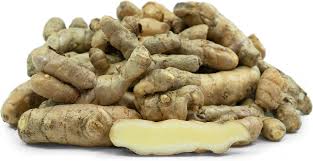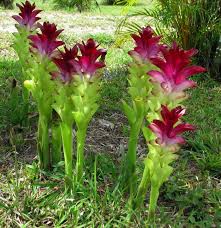Herbal Manetenance Ingredients
White Turmeric
White Turmeric
Curcuma zedoaria
Composition
Composition
Essential oils: Volatile oils in white turmeric are rich in antioxidants, which can help prevent skin problems and improve uneven skin tone, according to FOODHERBS.
Starch: A primary component of the white turmeric plant.
Curcumin: A key active compound with numerous health benefits.
Gums: Present in the rhizome.
Sesquiterpenes: The rhizome is a rich source of more than 10 sesquiterpenes, including ar-turmerone, α-turmerone, β-turmerone, zingiberene, and dihydrocurcumin. Other sesquiterpenes include furanodiene, α-phellandrene, 1,8 cineole, β-elemene, and germacrone.
Other compounds: Additional compounds include curzerenone, curzeone, 13-hydroxy germacrone, dihydrocurdione, and curcumenone.
- Carbohydrates:White turmeric contains carbohydrates, which are a primary source of energy for the body.
- Protein:It provides a small amount of protein, which is essential for tissue repair and growth.
- Fat:White turmeric contains some fat, including saturated, polyunsaturated, and monounsaturated fats.
- Vitamins and Minerals:White turmeric is a good source of vitamin C, which is important for immune function. It also contains various B vitamins, potassium, and magnesium, all of which play important roles in various bodily processes.
- Antioxidants:White turmeric contains antioxidants, which help protect the body against damage caused by free radicals.
- Essential Oils:White turmeric contains essential oils, which contribute to its aroma and flavor.
Key Nutrients and their Potential Benefits:
- Vitamin C: Supports immune function.
- Potassium: Helps regulate blood pressure and supports heart health.
- Magnesium: Important for bone health and nerve function.
- Curcumin: A potent antioxidant with anti-inflammatory properties.
Origins
Origins
White turmeric, also known as zedoary or Curcuma zedoaria, originates from South and Southeast Asia, specifically India, Sri Lanka, and Bangladesh.
Did you know?
Did you know?
Different from Yellow Turmeric:While both white and yellow turmeric are part of the same family, they have different properties and benefits.White turmeric is often preferred for sensitive skin or those seeking a gentle brightener, while yellow turmeric may be better for targeting hyperpigmentation or seeking stronger anti-inflammatory effects.
Traditional Medicine:It has been used for centuries in traditional medicine to treat various ailments, including digestive issues, menstrual disorders, and even cancer.
Ecological Role:White turmeric is an underrated gem in the world of biodiversity and ecosystem management. Its vibrant flowers not only add a splash of color to landscapes but also serve as a beacon for essential pollinators such as bees and butterflies. These pollinators play a critical role in the reproduction of flowering plants, thereby supporting a wide array of species within the ecosystem. Moreover, as the plant’s foliage naturally decays, it returns valuable organic matter to the soil. This decomposition process enhances soil fertility, promoting healthier plant growth and contributing to a more resilient ecosystem. By enriching the soil with nutrients, white turmeric indirectly supports a diverse range of plant and animal life, fostering a balanced and thriving ecological community. Its role in the ecosystem exemplifies the intricate connections between flora, fauna, and soil health, highlighting the importance of preserving such indigenous plants in local habitats.
Share


Collapsible content
HAIR BENEFITS
- Stimulates hair growth:By improving blood circulation to the scalp, white turmeric can create a more nourishing environment for hair follicles, potentially stimulating growth.
- Controls oil production:White turmeric's astringent properties can help reduce excess oil on the scalp, which can contribute to greasy hair and other scalp issues.
SCALP / SKIN BENEFITS
Scalp Health Benefits:
- Anti-inflammatory:White turmeric's anti-inflammatory properties can help calm irritated scalps and reduce inflammation associated with conditions like psoriasis.
- Anti-bacterial and anti-fungal:These properties can help treat dandruff and other scalp issues by combating bacteria and fungi that contribute to these problems.
- Stimulates hair growth:By improving blood circulation to the scalp, white turmeric can create a more nourishing environment for hair follicles, potentially stimulating growth.
- Controls oil production:White turmeric's astringent properties can help reduce excess oil on the scalp, which can contribute to greasy hair and other scalp issues.
Skin Health Benefits:
- Brightens complexion:White turmeric can help even out skin tone by reducing dark spots and hyperpigmentation.
- Fights acne:Its antimicrobial properties can help combat acne-causing bacteria and reduce breakouts.
- Soothing for irritated skin:White turmeric can soothe sunburn, reduce inflammation, and redness.
- Promotes collagen production:Curcumin, the active compound in turmeric, can stimulate collagen synthesis, which is essential for maintaining skin firmness and elasticity.
- Wound healing:White turmeric can help heal wounds by reducing inflammation and oxidation, and lowering the body's response to wounds.


